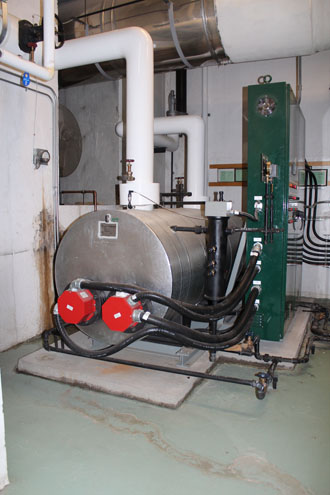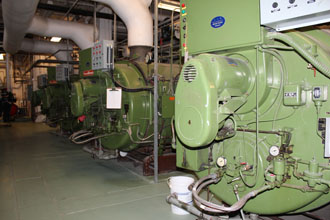 UWinnipeg a leader among Canadian universities; Manitoba government assists campus in cutting greenhouse gas emissions – Dr. Lloyd Axworthy, MLA Rob Altemeyer, Minister of Conservation and Water Stewardship Gord Mackintosh – July 30, 2013
UWinnipeg a leader among Canadian universities; Manitoba government assists campus in cutting greenhouse gas emissions – Dr. Lloyd Axworthy, MLA Rob Altemeyer, Minister of Conservation and Water Stewardship Gord Mackintosh – July 30, 2013
WINNIPEG, MB – The University of Winnipeg today announced it will meet and exceed its Kyoto commitment to reduce greenhouse gas emissions to 6% below 1990 levels, as mandated by the Board of Regents in 2005.The achievement is particularly significant as reduction results are taking place within the context of a major campus expansion which has added 36% to UWinnipeg’s space since 1990, with another addition – The UNITED Health and RecPlex now under construction. GHG emissions from buildings that existed in 1990 are down 35% since that year, and are being further reduced this summer to offset the impact of expansion.
“Creating a sustainable campus is not only good for the community, it is also good economics,” said Dr. Lloyd Axworthy, President and Vice-Chancellor, UWinnipeg. “Our overall greenhouse gas emissions reduction on campus means we are saving approximately $180,000 on our main campus annual energy bill. Given the serious impact of climate change and severe weather events, it is imperative that every institution, not only governments, show leadership and develop achievable sustainability goals.”
Axworthy added that achieving UWinnipeg’s Kyoto goal is equivalent to heating approximately 55 fewer houses. UWinnipeg was the first major post-secondary institution in Manitoba to implement a systematic greenhouse gas reduction strategy. UWinnipeg’s Board of Regents made the Kyoto commitment in March 2005. Since then, the University set out to measure and report GHG emissions from buildings and fleet vehicles.
“I am also announcing today that UWinnipeg is poised to go further. Our commitment now is to reduce our greenhouse gas emissions 10% below 1990 levels by the end of 2016. We further commit to setting regular reduction targets that reflect what scientists tell us is necessary to address climate change,” said Axworthy.
A Manitoba government investment of $ 2 million is assisting UWinnipeg to complete a comprehensive energy retrofit and exceed its Kyoto Accord commitment by August 2013. This key accomplishment, which adds to UWinnipeg’s growing reputation as a sustainability leader, was possible with the support from Manitoba’s Council on Post-Secondary Education (COPSE), Manitoba’s Climate Investment Pilot Program, Manitoba Hydro, the federal government and several private sector donors.
UWinnipeg remains committed to reporting GHG emissions in absolute terms and is not adjusting its baseline year to accommodate expansion.
Smarter buildings mean a reduced carbon footprint. UWinnipeg is incorporating the latest building automation technology across campus to reduce energy consumption. Numerous strategies to control energy use include indoor air quality sensors to adjust ventilation levels, occupancy sensors and event scheduling to turn mechanical and lighting systems on only when needed. By constantly monitoring all systems on campus that keep occupants comfortable, UWinnipeg can identify inefficiencies and energy waste which translates into lower operating costs and reduced emissions output.
“I want our province to be a place where forward-thinking solutions thrive and I am proud to partner with the University of Winnipeg in finding new ways to reduce our carbon footprint at the same time as expanding opportunities for Manitoba students,” said Conservation and Water Stewardship Minister Gord Mackintosh. “Their leadership is a green economy model for protecting our environment while ensuring a prosperous and environmentally conscious economy.”
UWinnipeg is achieving its Kyoto targets primarily through:
- Introducing a $2 million energy retrofit that began in 2011 to be completed over summer 2013, funded by Manitoba’s Council on Post-Secondary Education (COPSE), and Manitoba Climate Investment Pilot Program.
- Optimizing fuel mix in existing buildings by installing a hybrid heating system.
- Constructing high performance buildings that target a minimum LEED Silver Certification to mitigate the impact of campus expansion. This construction has been supported by the federal government’s Knowledge Infrastructure Program (KIP), COPSE, Manitoba Housing and numerous private donors.
U Winnipeg has started installing “energy dashboards” across campus to create environmental awareness by showing real-time building efficiency and consumption information, sustainability initiatives on campus, environmental tips and more. Interactive kiosks will allow users to learn more about our building consumption data such as electrical energy use, natural gas consumption, water use and current greenhouse gas emissions along with historical comparisons. The information can also be displayed in easy-to-read format using real world comparisons such as the numbers of toilets being flushed or the number of lights currently on in a building.
Winnipeg has started installing “energy dashboards” across campus to create environmental awareness by showing real-time building efficiency and consumption information, sustainability initiatives on campus, environmental tips and more. Interactive kiosks will allow users to learn more about our building consumption data such as electrical energy use, natural gas consumption, water use and current greenhouse gas emissions along with historical comparisons. The information can also be displayed in easy-to-read format using real world comparisons such as the numbers of toilets being flushed or the number of lights currently on in a building.
To harvest all of this data, smart meters are being installed in UWinnipeg’s buildings. By using these smart meters we can identify peaks in energy consumption to establish baseline energy loads that will help us identify when a building is not operating at optimum efficiency.
UWinnipeg has made significant strides in incorporating sustainability into its governance structures. It created a Vice-President (Human Resources, Audit & Sustainability) and a Director of Campus Sustainability, who provide leadership and support for ongoing improvements in sustainability governance and action with a Campus Sustainability Council and active support from the University’s senior executive, faculty and staff. The University also supports scholarship related to climate change through the Richardson College for the Environment, as well as through various other academic departments.
The Globe & Mail Canadian University Report 2012 ranked UWinnipeg first in Canada for its environmental commitment. UWinnipeg adopted a comprehensive new sustainability plan aimed at strengthening sustainability practices in all aspects of campus life in January 2012, building on numerous initiatives already underway, including:
Eco-friendly initiatives on UWinnipeg campus
- $2 million energy retrofit to main campus buildings to reduce emissions from these buildings and to offset the ongoing GHG impact of an expanded campus. Installed a hybrid heating system that will enable the University to replace higher-emitting natural gas with lower-emitting hydro electricity during off-peak times.
- First cosmetic pesticide-free campus in Manitoba, effective spring 2013.
- Partnered with the Forks Renewal Corporation in fall 2011 to send all campus food scraps, containers and cutlery to the Forks to be turned into compost for landscaping, allowing for a neighbourhood-level solution to waste management.
- Undergoing a major water retrofit project so all bathrooms on campus will have low-flow toilets and sinks (to be completed October 2013).
- Opened the UWSA Bike Lab to promote active and sustainable transit options for students, staff and the surrounding community. The Bike Lab offers free year-round programming including bike maintenance and safety workshops.
- Introduced phosphate-free detergents and environmentally friendly cleaning products for use on campus.
- Established an Academic Working Group on Sustainability in 2012 to examine sustainability content in UWinnipeg’s curriculum and research. This is in preparation for participation in STARS (Sustainability Tracking, Assessment & Rating System), a third party transparent framework which allows colleges and universities to measure their sustainability performance.
- Became the first University in Canada to ban the sale of bottled water, an initiative led by students that spread quickly across the country.
- Introduced double-sided printing as default on all copiers and printers on campus.
- All new construction projects are built to LEED Silver standards or better. Both McFeetors Hall: Great-West Life Student Residence and The University of Winnipeg Students’ Association Daycare Centre joined an elite group of eco-friendly buildings in Manitoba by achieving LEED Silver status (November 2011).
- Established Diversity Foods as the main campus food service provider, a social enterprise sourcing a significant amount of its food from local producers and using compostable cutlery, cups and to-go containers.
The University of Winnipeg is grateful to its public and private supporters, funders and donors who have assisted the institution in achieving its GHG reduction goals, and who have contributed to lessening the University’s impact on the environment.
MEDIA CONTACT
Diane Poulin, Communications Officer, The University of Winnipeg
P: 204.988.7135, E: d.poulin@uwinnipeg.ca





